What's New**
The current working version is 1.9.1
- Bug Fixes
QUICK INSIGHTS
Acquire page-level insights with rapid response times.
Avoid the hassle of analyzing page source code. Instantly access essential elements with just a click (and yes, we also examine X-Robots HTTP headers).
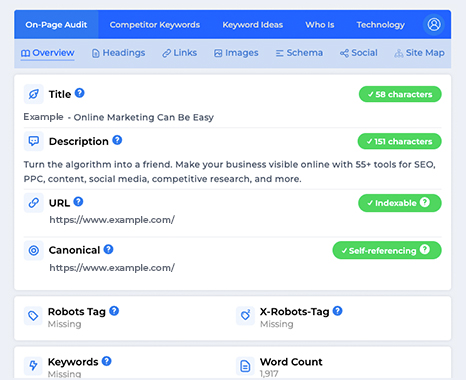
View all heading tags in one quick overview.
Not just unveiling their arrangement via indentation, but also highlighting dynamic changes in font sizes.
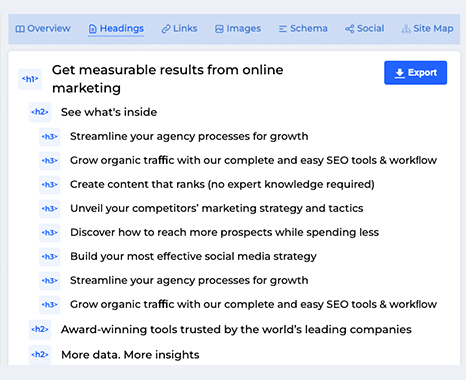
Schema Information
Schema markup is important for websites and it helps organize and label content. This helps search engines understand the meaning and importance of information shown on websites. Schema is important because it helps search engines understand content better, so they can make better search results.
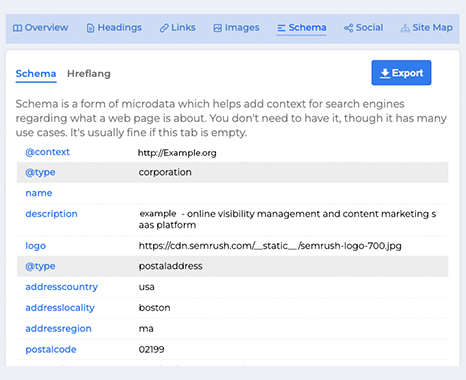
Og Tags
Add custom tags to the keywords you want to group together. Mark your focus keywords as favourite. Use the refresh feature whenever you want to see the latest rankings.

Quick Breakdown of SEO Domain Extension features
Competitor Keyword Growth Overview Graph
Agency Dashboard SEO Extension shows how keywords are performing for a URL with an organic keyword growth graph. You can also track the position and volume of up to 100 keyword entries. The table also shows the SERPs for the keywords present on the page.
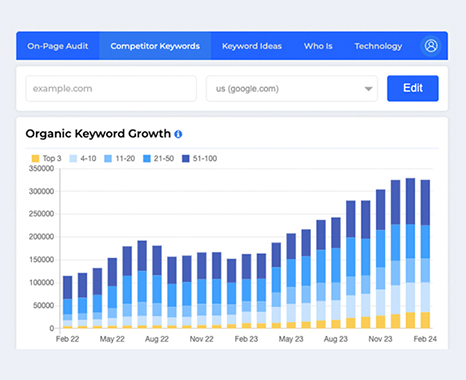
Keyword Ideas
We've added a new feature of keyword ideas that fetches the information from your URL and the keywords it's optimized for. Further, it suggests possible keywords for which you optimize your page for a better ranking. You can get a list of up to 100 keywords on one display and export them to a Microsoft Excel sheet from the extension. On clicking the "Advanced Search" option, you get redirected to our free keyword research tool for a detailed output.
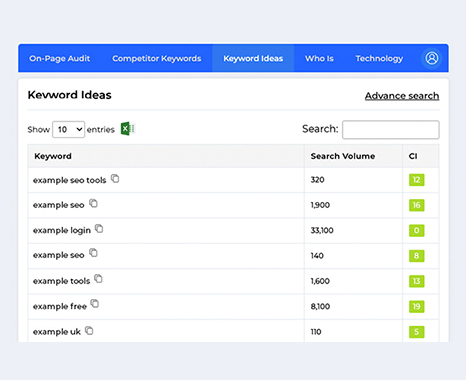
Who Is (In-Depth Domain Analysis)
As the name suggests, the Who Is section in the Agency Dashboard SEO extension gives the domain information. On clicking the "Who Is" section in the extension, you get the following information:
- Domain name
- Registrar Information
- Whois server
- Updated last (last time the domain was updated)
- Creation date (the date on which the domain was created)
- Expiration date (the day the domain will expire)
- Name servers (List of name servers on which the domain is running)
- Status (Give information about the ownership status of the domain and whether it can be transferred or not)
- Emails
- dnssec (informs you whether the domain has a signed/unsigned NSEC record)
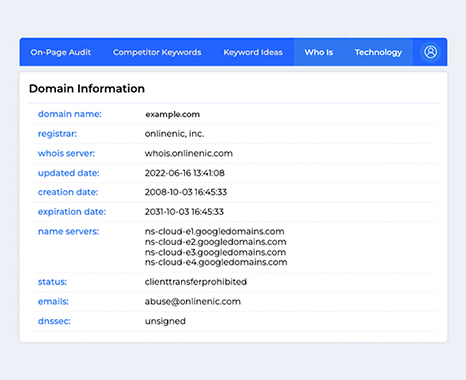
Technology Stack
This section in the free SEO extension tool will give you information regarding the technology used in building the website. Under this section, you'll find the information regarding the following things:
- Web Framework
- Programming Language used
- Types of CDN (Content delivery network)
- Web Server type
- Operating System
- same as above
In addition to these features, you can also access your Agency Dashboard account from the extension by clicking on (Insert icon Image). This will give you access to your dashboard where you can check all your campaigns.

Frequently Asked Questions (FAQs)
An SEO plugin helps businesses improve online visibility and attract more organic traffic to their website. Here are some ways in which an SEO extension plugin can help a business:
- On-Page Optimization: SEO plugins often suggest optimizing on-page elements such as titles, meta descriptions, headers, and image alt text. This helps ensure that your content is well-optimized for search engines, making it more likely to rank higher in search results.
- Keyword Optimization: SEO plugins typically offer features that help you research and optimize your content for relevant keywords. This ensures that your website targets the right keywords. These words are what customers use to find products or services like yours.
- Content Analysis: Many SEO plugins analyze the content on your website and provide insights into its quality and relevance. This includes checking for duplicate content, readability, and other factors that can impact your site's search engine rankings.
- XML Sitemaps: SEO plugins can create XML sitemaps for search engines to easily explore and categorize your website. A well-structured sitemap can improve the visibility of your content in Google search console engine results.
- Schema Markup: Some SEO plugins allow you to add schema markup to your website easily. Structured data helps search engines understand your content better, resulting in more informative and visually attractive search results.
- Link Management: SEO plugins can assist in managing internal and external links on your website. Proper linking is crucial for both user experience and search engine rankings.
- Social Media Integration: Some plugins offer features that allow you to integrate social media into your SEO strategy. It has buttons for sharing, tags for visibility, and other features to improve social platform content.
- Performance Optimization: Search engines consider website speed and performance as ranking factors. Some SEO plugins can improve your website's speed and search engine rankings by optimizing its performance.
- Analytics Integration:SEO plugins help you track and analyze your website's performance, like traffic and user behavior, with analytics tools.
- Regular Updates: SEO algorithms and best practices are constantly evolving. A good SEO plugin regularly updates itself to stay aligned with the latest industry trends and search engine algorithms.
The frequency of updates for an SEO extension plugin depends on the specific plugin and its developers. Regularly updating SEO plugins to match search engine changes, fixing security issues, and adding new features. Some SEO plugins get updates every month or every three months, while others update more or less often.
Users should visit the plugin's official website or documentation for updated schedules and release notes. Staying updated is important to make sure the plugin works well for search engines and keeps the website running smoothly.
The web browsers for an SEO plugin can differ based on the plugin and its developers' choices. SEO plugins work with popular browsers like Google Chrome, Mozilla Firefox, Microsoft Edge, and Safari. These browsers have large user bases, making them a priority for plugin developers.
Check the official documentation or the plugin's website before installing an SEO extension to know which browsers support it. Developers often provide a list of compatible browsers and any potential limitations or features that may be browser-specific. Keeping the plugin updated to the latest version ensures optimal compatibility with the supported web browsers.
Using an SEO extension plugin on many websites depends on the plugin and its licensing terms. If the plugin is free, you can use it on multiple sites without any restrictions. However, it is important to review the terms of use provided by the plugin creator.
Premium SEO plugins require a separate license for each website. Additionally, the price of the license may vary based on the number of sites you intend to utilize it on. Some developers offer special licenses for developers or agencies managing multiple client websites. Subscriptions allow the use of the plugin on many sites while the subscription is active, giving more flexibility.
Check the plugin's website or documentation for the licensing terms, and seek assistance from the developer's support if needed. This is important to follow the rules and avoid problems later on. Using a plugin without the proper licensing may result in violations of terms of service and potential consequences.
Many SEO extension plugins do provide keyword suggestions for optimizing a page. We base suggestions on factors like search volume, competition, and relevance to the page's content.
The goal is to help users identify and incorporate relevant keywords that are likely to improve the page's visibility in search engine results.
Keyword suggestions can come in various forms. You can recommend keywords related to the content. They can also be long-tail keywords or commonly searched variations. Some SEO plugins integrate with external keyword research tools and databases to offer more comprehensive suggestions.
Using SEO extension plugins, like other browser extensions, can raise privacy concerns based on the required functionalities and permissions. Here are some common privacy considerations:
- Data Collection: Some SEO extensions may collect data about your browsing habits, the websites you visit, and the searches you perform. Various purposes, including improving the extension, analytics, or even marketing, can potentially use this data.
- Access to Personal Information: Check the permissions required by the extension. Some extensions may request access to your browsing history, cookies, or other personal information. You must know why you need access and decide if you are okay with giving those permissions.
- Security: Ensure that the extension is from a reputable source. Malicious or poorly designed extensions could potentially compromise your online security and privacy. Stick to extensions offered by trusted developers or well-known companies.
- Third-Party Integrations: If the SEO extension connects with other services, understand how it shares your data with them. Check the privacy policies of both the extension and any associated third-party tools.
- User Authentication: Some extensions might ask for authentication to access your SEO-related data or link to your SEO tools accounts. Be cautious about providing login credentials and ensure that the extension is secure.
To mitigate potential privacy concerns:
- Read Reviews: Check reviews from other users to see if there are any privacy-related complaints or issues with the extension.
- Review Permissions: Before installing any extension, review the permissions it requires. Only grant the necessary permissions for its functionality.
- Regular Updates: The developer must regularly update the extension. Updates often include security patches and improvements.
- Check Privacy Policy: If the extension has a privacy policy, you should read it to understand how it will handle your data. Reputable extensions typically have clear privacy policies.
 Add to Chrome
Add to Chrome